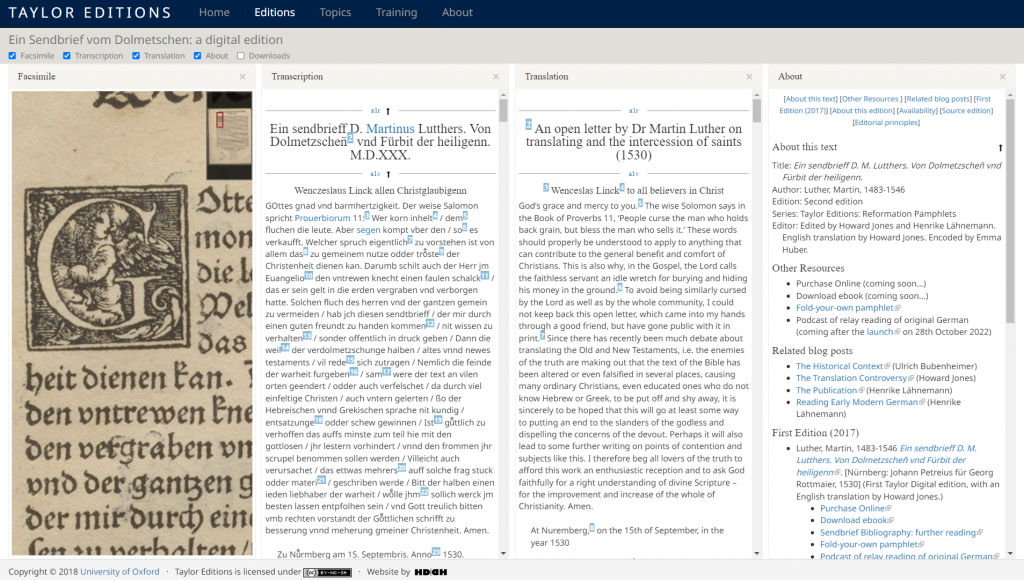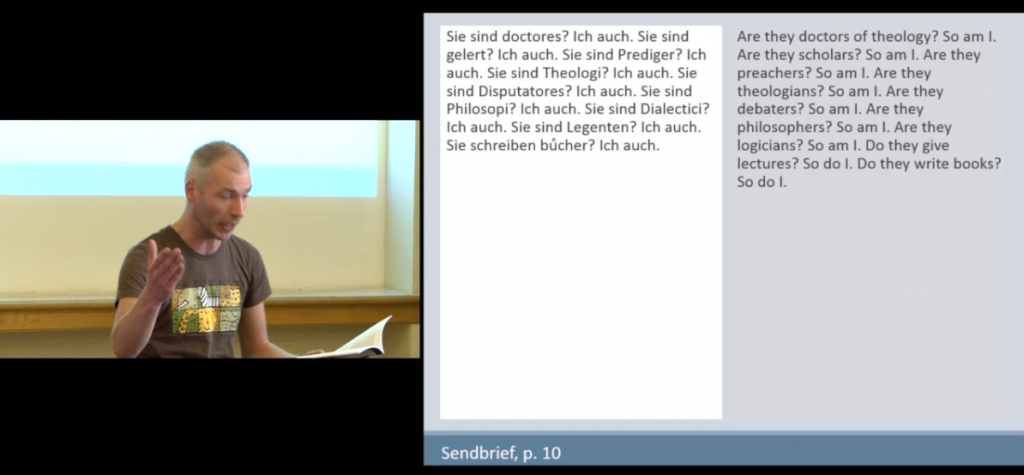When: Friday 28 October, 5-6:30pm. Where: Taylor Institution Library, Room 2, St Giles, OX1 3NA, Oxford. What: Launch of the updated and expanded edition of the Taylorian copy of Martin Luther’s seminal ‘Sendbrief vom Dolmetschen und Fürbitte der Heiligen’ (Open Letter on Translating and the Intercession of Saints) with a presentation on Luther’s translation principles and a full reading of the Letter in German with the new English translation as subtitles
Readers in order of appearance: Howard Jones, Lewis Ebert, Charlotte Copeman, Marlene Schilling, Luise Morawetz, Felix Clayton McClure, Kathrin Luddecke, Edmund Wareham, Monty Powell, Weertje Willms, Lavinia Kamphausen, Emir Kayahan, Oscar Jelly, Katarina del Moral, Mai-Britt Wiechmann, Julia Lorenz, Lars Klehn, Hans Hahn, Henrike Lähnemann, Anna Linton, Daniel Earle, Aldo Ruggiero, Stephanie Hathaway, Sebastian Straßburg, Alexandra Hertlein, Ruth von Bernuth, Eleni Pavlopoulos, Katarina Ristic, Emma Huber, Panayotis Galatis, Tara Williams, Lilian Szych, Lena Vosding, Petra Wilson, Heike Krüsemann, Reinier van Straten


In 2016, the Taylor Edition Series ‘Reformation Pamphlets’ started as a project to make the treasures of the library accessible to a wider audience. The first pamphlet chosen was Martin Luther’s Sendbrief. It had been a set text for Oxford students of German since 1917, the 400th anniversary of the publication of the ‘95 Theses’, and had shaped teaching on translation, historical linguistics, and the development of German literature since then – echoes of it can be seen in publications by alumni, e.g. the chapter on Martin Luther’s Bible translation in Neil MacGregor’s ‘Germany, Memories of a Nation’, available as podcast ‘Luther and a Language for All Germans’ on the BBC website. The other reason was that it had already been chosen as basis for a facsimile in honour of the quincentenary of Luther’s birth in 1983, with a typed note at the back by Kevin Hilliard, with hand-written umlaut markers.
This first edition was appropriately launched in 2017 during a visit of a delegation from Bonn for the celebrations of 70 years of town twinning with a full reading of the text.

https://podcasts.ox.ac.uk/sendbrief-vom-dolmetschen
We also added in a downloadable Fold-your-own pamphlet reconstruction of the original quires of the pamphlet. In the following years, we decided to track the development of the Reformation, starting with the ’95 Theses’ and the ‘Sermon von Ablass und Gnade’ (1518/ 2018). Each of the editions added further elements: an increased focus on the materiality for the two copies of the ‘Sermon’, more linguistic analysis and footnotes in ‘Von der Freiheit eines Christenmenschen’ (1520/2020), and the comparison of several different editions for the ‘Passional Christi und Antichristi’ (1521/2021). Alongside the print publications, the Reformation series produced 15 further digital editions, numerous History of the Book student projects, and expanded the provision of teaching for the linguistic papers. It seemed the right moment to publish as fifth print-on-demand publication in 2022 an updated and extended version of the Sendbrief, coinciding with the quincentenary of Luther’s New Testament translation, the issues of which are discussed in the pamphlet.
This is an edition intended as a study guide, helping to understand the original text in its early new high German language and in the form of a pamphlet typeset and printed under the conditions of a 16th century workshop as represented by the specific copy in the Taylorian (chapter 2). Chapter 3 on ‘Reading Early New High German’ is designed to facilitate understanding of the facsimile and the diplomatic edition. The background chapter 4 covers both the historical background of the pamphlet and its significance for understanding Luther’s Bible translation.
The Sendbrief has been claimed with Luther’s Bible translation to be the birthplace of modern German language. This edition allows anybody to examine for themselves critically such claims and will hopefully lead to further studies, editions, and the enjoyment of a highly influential early modern text in teaching and studying.
Acknowledgements
This has been a shared enterprise, resembling at times the Wittenberg circle of translators who, judging by what Luther tells us in the Sendbrief, would agonize over a single word for weeks. We are indebted for their help to numerous colleagues who made suggestions on a linguistic, book historical, or theological level, among them Jeffrey Ashcroft, Martin Keßler, Anna Linton, Alastair Matthews, Charlotte Methuen, Edmund Wareham, Helen Warner, and Chris Wells. A special thanks goes to Ulrich Bubenheimer for providing the new chapter on the historical context. The tutors for the Historical Linguistics paper in 2021, Sarah Fengler, Carolin Gluchowski, Alexandra Hertlein, and Luise Morawetz, provided detailed feedback on the translation and commentary, and several student cohorts of the course helped by working with various iterations of the text.

The volume is dedicated to the memory of John Flood and Nigel F. Palmer, who followed the series from the start and shaped our approach to the edition, translation, and commentary, and whose scholarly generosity lives on in the community of teaching and learning represented in this volume.
Further Reading
1. The Historical Context (Ulrich Bubenheimer)
2. The Translation Controversy (Howard Jones)
3. The Publication (Henrike Lähnemann)
4. Reading Early Modern German (Henrike Lähnemann)
*** Cover illustration: Historiated G initial showing Phyllis riding Aristotle in Petreius’ edition of Luther, Sendbrief (Taylorian), a2r

1 thought on “Launch of the Sendbrief vom Dolmetschen”